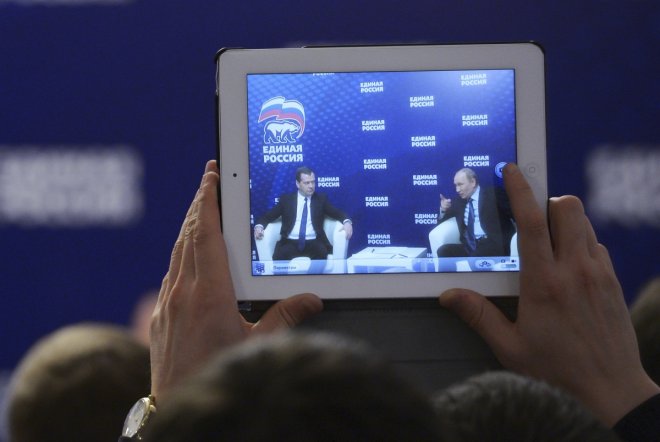
Russia’s Information Warfare Targets Washington and NATO
Publication: Eurasia Daily Monitor Volume: 12 Issue: 74
By:

On April 16–17, the fourth Moscow International Security Conference was held amidst continued disagreement between Russia and the United States and its allies over Ukraine. As usual, the conference was addressed by Defense Minister Sergei Shoigu, Foreign Minister Sergei Lavrov, as well as Army-General Valery Gerasimov, the chief of the General Staff, and other members of the Russian political-military leadership. In addition, in the context of the United States and European Union’s ongoing sanctions regime against Russia, the only foreign government to send a senior representative to the Moscow conference was Greece. The theme of this year’s event, shortly before the celebrations to mark the 70th anniversary of end of the Great Patriotic War (World War II), was to link the defeat of Nazism with Moscow’s recent efforts to confront modern security challenges. The underlying message was for Washington and the North Atlantic Treaty Organization (NATO): the Kremlin understands that the current confrontation will persist and has no intention of backing down (Lenta.ru, April 18).
Given the fragility of the ceasefire in southeastern Ukraine and steps to implement the Minsk Two agreement, combined with the depth of the crisis in Moscow’s relations with the US, NATO and the EU, it was hardly surprising that the conference resulted in senior Russian politicians and top military brass pointing their fingers at potential adversaries. Previous iterations of the conference had examined missile defense, European security, and the problems of global and regional stability. Indeed, the 2014 conference was a platform to expound Kremlin-backed thinking on the need to counter the threat of color revolutions. Although President Vladimir Putin did not attend the conference, his written speech was declaimed by Nikolai Patrushev, the Secretary of the Security Council and former head of the Federal Security Service (FSB). Unsurprisingly, Putin linked the defeat of Nazi Germany 70 years ago to the challenges and threats facing Russia today: deviations from the international security system are marked, in Putin’s view, by a lack of respect for the internal affairs of countries and the promotion of color revolutions (Krasnaya Zvezda, April 16).
The keynote speech was delivered by Defense Minister Shoigu. It contained no real surprises. He referred to the historic confrontation between the Soviet Union and Nazi Germany, saying it is equally important today to oppose fascism and other forms of extremism. However, according to the Russian defense minister, a serious threat to international stability has emerged, due to a number of “countries” trying to impose their will on others, “arbitrarily” interpreting the “basic norms of international law,” using “double standards,” and interfering in the internal affairs of “sovereign states”—in clear reference to the US and its NATO allies. Take as an example, the case of Ukraine. Shoigu told the audience of defense specialists and academics from 70 countries, the US and its allies promoted regime change in Ukraine and plunged the country into Civil War. Moreover, Shoigu dismissed Western assertions that Russia has acted aggressively in Ukraine, reminding the conference about the NATO bombing of Serbia in 1999 and the later separation of Kosovo, the invasion of Iraq in 2003 and bombing of Libya in 2011 destabilizing “entire regions” (Krasnaya Zvezda, April 16).
The perpetrators of these actions, including the promotion of color revolutions, were the US and NATO, according to Shoigu. On this basis he cast aside Western criticism of Russia’s seizure of Crimea. And linking sanctions to a Western information war against Russia, Shoigu alleged that Washington and NATO still push further expansion close to Russia’s borders. He closed by saying that despite these problems in international security, Moscow is willing to cooperate with foreign partners on the basis of “equal and indivisible” security. These themes were underscored in the speeches by both Gerasimov and Lavrov, with the former explaining Moscow’s current concerns about NATO, including increased exercises and the creation of the spearhead rapid reaction force with temporary basing rights in Eastern Europe and the Baltic States. Gerasimov told the conference that NATO’s recent measures are not regarded by Moscow as “defensive” and said that missile defense is about a US quest for “global domination” (Krasnaya Zvezda, April 16).
Deputy Defense Minister Anatoly Antonov was so wrapped up in the undeclared conference theme of attacking the US and NATO that he continued even after the conference ended. He tried, for example, to portray Moscow as being perfectly open and reasonable with the Alliance, offering to discuss how to restore confidence in NATO’s relations with Russia. However, he soon added a host of problems that Moscow has with US and NATO policy. Antonov highlighted Moscow’s earlier need to suspend its participation in the Conventional forces in Europe (CFE) Treaty in 2007, and the negative reaction by NATO following the Russia-Georgia war in 2008. But he never drifted from the official script to attack the Alliance for its constant eastward enlargement since the end of the Cold War (Rossisyskaya Gazeta, Lenta.ru, April 18).
By far the greatest public relations coup for Moscow was to secure as a conference participant the Greek Defense Minister Panos Kammenos. On April 15, Kammenos told Shoigu: “Greece and Russia are two countries with historic and religious ties, and in our meeting we reaffirmed the friendly relations of the two countries.” He also addressed the conference, and according to the Greek media the defense minister disagrees with the EU sanctions against Russia and promises that his government will work to change this policy (Athens News Agency, April 15). Of course, the recent change of government in Athens and their economic hardships in the Eurozone are clear factors influencing Greece’s newfound friendship with Russia; but, the Kremlin will doubtless see this as clear evidence of the lack of unity in Europe over Moscow’s actions in Ukraine.
The Moscow International Security Conference has become an intrinsic part of Russia’s informational warfare tools being used against Washington and NATO. Its language and signals are unmistakable: the Kremlin considers the United States and NATO to be far greater threats to Russian security than international terrorism or other transnational security threats. It also demonstrates no willingness to back down in its confrontation with Western governments over Ukraine. With NATO’s efforts to reassure some member states and deter Russia, coupled with American military trainers arriving in Ukraine, or possible US lethal aid options, the chances of either side misreading the other remain very realistic. The tone of the conference, markedly more anti-Western than in 2014, highlights the somber mood permeating the power circles in Moscow.




